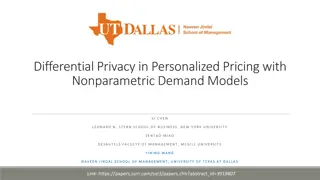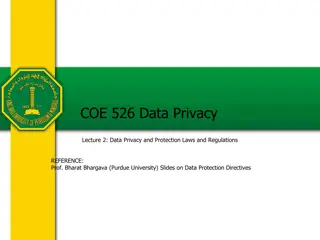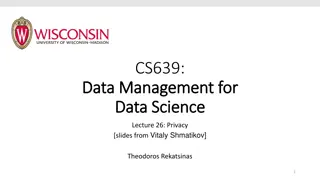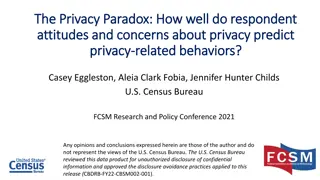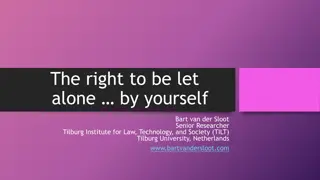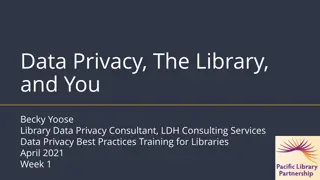Exploring Computer Ethics and Privacy Principles
Computer ethics and privacy principles are essential in the evolving technology landscape. This content delves into different perspectives on computer ethics, views on privacy protection, and the implications of human enhancements. It highlights the importance of respecting proprietary rights, sharing information ethically, and safeguarding privacy in the digital age. The discussion also touches on the ethical considerations of human enhancements and the role of technology in shaping ethical standards.
Download Presentation

Please find below an Image/Link to download the presentation.
The content on the website is provided AS IS for your information and personal use only. It may not be sold, licensed, or shared on other websites without obtaining consent from the author. Download presentation by click this link. If you encounter any issues during the download, it is possible that the publisher has removed the file from their server.
E N D
Presentation Transcript
What is Computer Ethics? Deborah G. Johnson: Respect for Proprietary Rights Richard Stallman: Sharing Eugene H. Spafford: Something irrelevant - the general public too uneducated Peter G. Neumann: Must be replaced by security John Weckert: A complex matter James H. Moor: A matter of privacy Swedish Banks: Good taste Krystyna G rniak-Kocikowska: Something global NSF Ethics of Human Enhancements: Something that lags (far) behind Council of Europe: Computer ethics?
James H Moor High speed computers- privacy Computers memory undercuts human fraility to assist privacy Greased information is available for any purpose Core values= a value humans and cultures need for survival. Privacy is not a core value, but it expresses a core value Normative privacy-protected by ethical, legal conventional norms Normative privacy often natural as well
Views and principles Restricted access view:focuses what to concider when developing policies for protecting privacy The publicity principle:rules and conditions that govern private situations should be clear and known to the persons affected by them The adjustment principle: If the private circum stanses justify a change in parameters of a private situation, then the alteration should be an explicit and public part of rules and conditions that govers the private situation
Ethics is implicit in this paper: The harm caused by the discloser will be so much less than the harm prevented that an impartial person would permit breach in this and in morally similar situations Ethics in this paper- implicit and ends up in dilemman of what is best, right, wrong and so on
Ethics of human enhancements Human Enhancement [HE]- technology into our bodies Definitions of HE: Changes the structure and function of the body Discusses grey zones- when is it HE and when it is not? Questions what is morally problematic and what is not Uses the concepts ethic and moral without defining them Ethics in this paper-just uses, no defintions
Questions to discuss What are the concequences of differences in understandings of ethics? Can technology and technology design be used to increase ethical quality and reduce negative concequences of differences in conceptual interpretations?
Old and new ways of thinking With the virtualization of data, the way we are thinking and interacting with it changes. The question about harm that is done when violating virtual property/artifacts is much harder to answer. Those authors that try to find analogies in the material world, struggle to make their argumentation coherent. Is a new ethical framework needed?
Perception of data The issue of privacy The issue of property Personal Information Creation Dataweperceiveas ours Theindividual

 undefined
undefined



